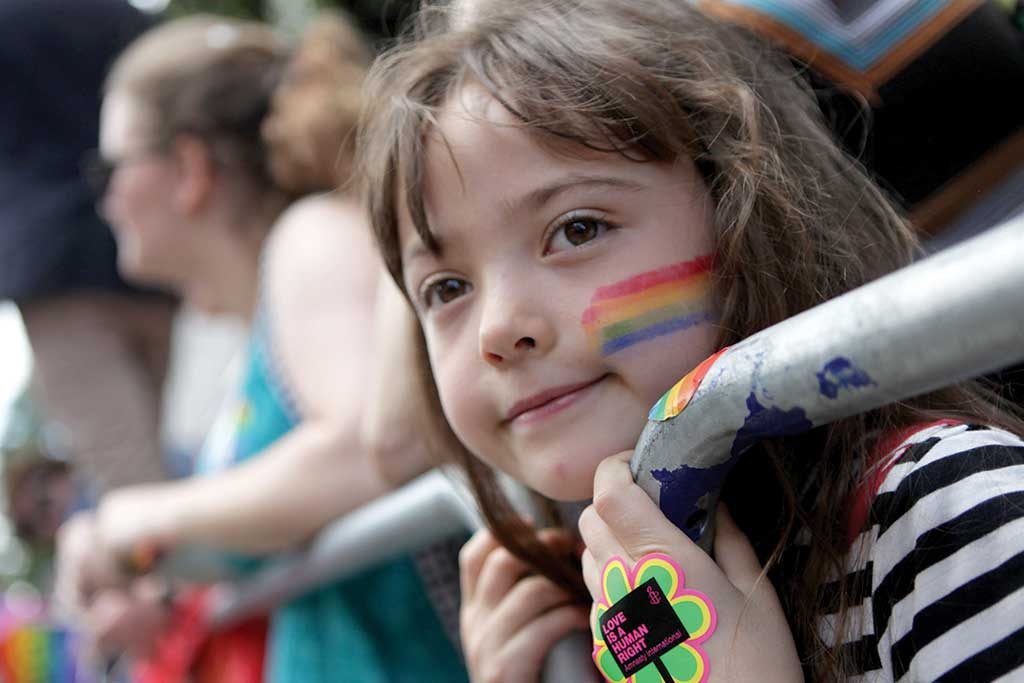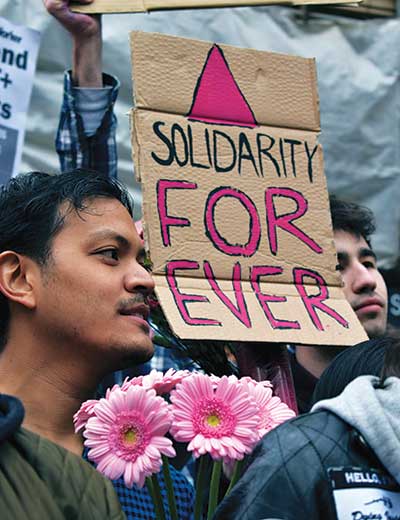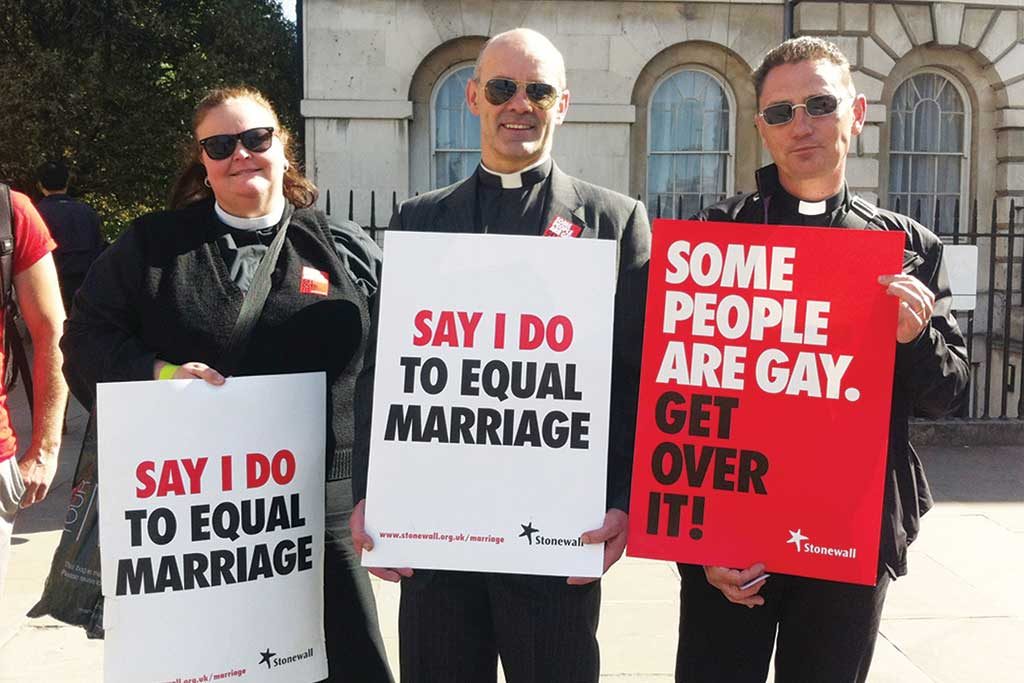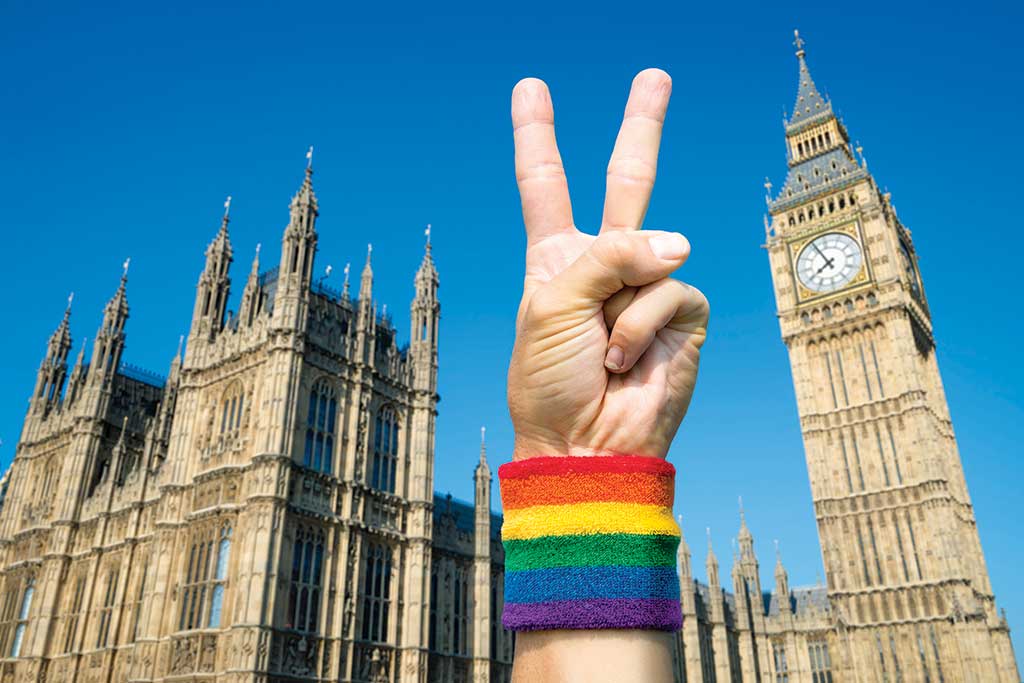The wealth of queer art and culture on show in Britain throughout 2017 is in stark contrast to the harsh reality that many LGBT people still face in the wider world. While Britain celebrates this significant anniversary, gay men and lesbians in many other parts of the world have few reasons to celebrate. Ironically, a large percentage of the world’s LGBT population suffer prejudice and discrimination today because of the legacy of the British Empire. In fact, consensual homosexual activity remains a criminal offense in the majority of countries that make up the Commonwealth of Nations, an organization of 52 member states that are mostly former territories of the British Empire.
“Homosexuality remains a criminal offence in 36 out of the 52 member states, with penalties ranging from a few years jail to life imprisonment,” Peter Tatchell elaborates. “In parts of two countries, Pakistan and Nigeria, LGBTI people can be executed under Sharia law. Ninety per cent of Commonwealth countries have widespread discrimination and hate crime against known or suspected LGBTI people. LGBTI victims have little or no legal protection or redress.”

Pride 2015
“Nearly all the homophobic laws in Commonwealth countries were originally imposed by Britain in the 19th century when it was the occupying colonial power,” he adds. “Anti-LGBTI attitudes were imported by Christian missionaries and promoted by the colonial administrations. These are the poisonous legacies of colonialism.”
“We also work closely with international activists,” says Stonewall CEO Ruth Hunt, “helping to coordinate international reaction in times of crisis and offering support where we can. We also deliver groundbreaking empowerment programs in some of the most hostile countries in the world. This work is always led by activists. We know for change to be effective, sustainable, and most importantly safe, it needs to be led by the people who are directly affected.”
“Of the 15 countries in southern Africa, ten are former British colonies. Save for South Africa, the remaining nine have retained the sections of British colonial penal codes that penalize adult, consensual sexual relations ‘against the order of nature’—the so-called sodomy clauses,” says Tendai Thondhlana, communications officer of The Other Foundation, an organization that works to defend and advance the rights of LGBTI people in southern Africa. “These penalties are the basis upon which adult, consensual sexual relations between two people of the same sex are deemed illegal in these countries today. Prior to British occupation, and in all the fifteen southern African countries, no laws governing or penalizing consensual sexual activities between adults existed.”


The effect of these discriminatory laws is to make homophobia commonplace in southern Africa. “LGBT communities have been rendered invisible to the point to being virtual,” Tendai continues. “The lack of visibility has not only made it difficult to identify and cater to this community’s unique needs, but also makes it difficult to advocate for its inclusion, participation, and protection—meaning that LGBT persons in southern Africa are very vulnerable and exposed.”
I spoke to an LGBT activist from the Caribbean island of Grenada, a British colony from 1763 to 1974, and now part of the Commonwealth, and his personal experience echoes this. “People who are perceived as LGBT in Grenada face exclusion from, and ostracism in social, religious, work, and familial spaces,” he says. “Because Grenada is quite small, this exclusion and ostracism has particularly negative impacts. People perceived as LGBT also face street harassment and randomized violence. Consequently, LGBT people mostly live closeted lives. These factors are mitigated or exacerbated according to social status, gender, and other social metrics. Laws criminalizing homosexuality continue in force, underpinning and endorsing social prejudice in a vicious cycle.
“Prior to British colonial rule, there was no evidence of antipathy toward non-heterosexual sexual behaviors or identities in Grenada. The criminalization of homosexuality and prejudice against homosexuals is a direct consequence and legacy of British Victorian sexual values, exported as sodomy laws and other related laws to the former colonies.”
So what does the future hold for the LGBT population of countries like Grenada? “Attempts by foreign advocates to directly impact local attitudes are seen as neo-classical or imperial interference.
But it is extremely helpful to advocates in Grenada and the wider Caribbean if advocates in the UK and beyond use this opportunity to raise awareness to the fact that Britain inflicted these laws on their former colonies, and that 50 years after the UK has decriminalized homosexuality, these laws still continue in force in the former colonies. LGBT people continue to be prosecuted, or the symbolic force of the law renders them second-class unapprehended felons. This can raise crucial awareness and create political will, while avoiding the pushback that comes from being told what to do by foreign countries.”
“In all 15 southern African countries, communities of LGBT people are organizing and developing strategies and approaches to allow them to claim their basic human rights from their governments, while rendering to them the most basic services denied them by legal policy and societal homophobia,” Tendai adds. “The important work done by these communities and organizations requires financial and other forms of support in often limited resource environments, which often limits the breadth, depth, and effectiveness of their initiatives.”
The LGBT population of another former British colony, India, face similar issues due to the lingering influence of British Colonial law. “Section 377 of the Indian Penal Code plays a major role in the marginalization of LGBT+ people,” says Niranjan Kamatkar, advocate and artistic director of British-based LGBT arts organization Wise Thoughts. “…police harassment or extortion of money, the possibility of blackmail, misinformation, and the huge fear of being caught and subsequent social stigma plays a large role in smaller towns, cities, and villages where many LGBT individuals are without any network or peer support. In a society that can be very ‘traditionalist,’ hierarchical, and, with recent resurgence of ‘religious right’ parties in power, those accused attract minimal societal support or sympathy. In short, the stigma is comparable to being an untouchable in the wider society.”
Commonwealth nations where homosexuality is still a criminal offense and punished by imprisonment include: Cameroon, Ghana, Kenya, Northern and Southern Nigeria, Swaziland, Tanzania, Uganda, and Zambia in Africa; Bangladesh, Brunei, India, Malaysia, and Pakistan in Asia; Antigua & Barbuda, Grenada, Guyana, Saint Kitts and Nevis, Saint Lucia, and Saint Vincent in the Caribbean—and in some of these places, homosexuality is still punishable by death. Other Commonwealth nations where it’s illegal, although not strictly enforced (but continues to have a very negative impact), include Malawi, Namibia, Sierra Leone, Singapore, Sri Lanka, Barbados, Dominica, Jamaica, and Trinidad and Tobago.
As Peter Tatchell already explained, it took decades of LGBT protest to repeal Britain’s anti-gay laws, and Britain’s former colonies face a similarly lengthy fight to finally abolish the anti-gay heritage of British colonialism. Grass roots organizations need our support to do this. But perhaps in the not-too-distant future, we will be celebrating not just British queer art and culture, but also vibrant LGBT art and culture from every country in the world.


equality resources
LGBT ART & CULTURE
British Museum, Great Russell Street, London WC1B 3DG. Must see exhibit titled “Desire, Love, Identity: Exploring LGBTQ Histories” runs until October 15, 2017. www.britishmuseum.org
Britten-Pears Foundation, The Red House, Aldeburgh IP15 5PZ. “Queer Talk: Homosexuality In Britten’s Britain” runs until October 28, 2017. www.brittenpears.org
National Trust. For more information on the National Trust’s “Prejudice and Pride” programme of events, visit www.nationaltrust.org.uk/prejudiceandpride
People’s History Museum, Left Bank, Spinningfields, Manchester M3 3ER. “Never Going Underground: The Fight For LGBT+ Rights” runs from now until September 3, 2017. www.phm.org.uk
Tate Britain, Millbank, London SW1P 4RG. “Queer British Art 1861 – 1967” runs until October 1, 2017. www.tate.org.uk/britain
Walker Art Gallery, William Brown Street, Liverpool L3 8EL. “Coming Out: Sexuality, Gender and Identity.” Through November 5, 2017. www.liverpoolmuseums.org.uk/walker
TAKE ACTION
To support the work of The Other Foundation visit www.theotherfoundation.org
For more information about Stonewall visit www.stonewall.org.uk
For more information about the work of Peter Tatchell, visit www.petertatchellfoundation.org
To learn more about the Wise Thoughts organization visit www.wisethoughts.org


